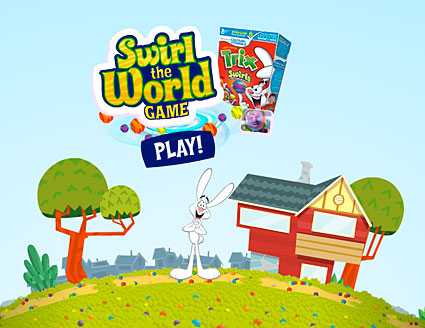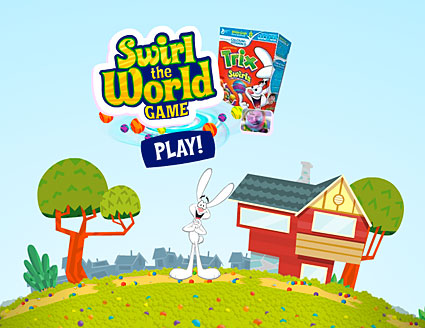 One of several games for kids on the Trix websiteHere’s more compelling evidence that food companies, putative key “partners” in the battle against obesity, aren’t exactly acting in good faith. They may talk about calorie-cutting partnerships and donate money to healthy-living initiatives — but they don’t put their real money where their collective mouth is.
One of several games for kids on the Trix websiteHere’s more compelling evidence that food companies, putative key “partners” in the battle against obesity, aren’t exactly acting in good faith. They may talk about calorie-cutting partnerships and donate money to healthy-living initiatives — but they don’t put their real money where their collective mouth is.
I’m referring, of course, to the billions of dollars in advertising that Big Food directs at children every year. Even as pressure continues to grow for government restrictions, Big Food has already moved on. A study out of UC Davis (via Science Daily) shows that the new frontier in junk food advertising is the Internet, thanks to an explosion of so-called “advergames.”
Study authors Diana Cassady and Jennifer Culp watched Nickelodeon and Cartoon Network and recorded the websites mentioned during ads on those channels. They then examined 19 websites, 290 web pages and 247 advergames. Here’s what they found there:
- Close to one-third of the advertising that included websites was for food.
- The most frequently used strategy to encourage ongoing and return website visits was advergames — 84 percent of the websites assessed included online games.
- Every advergame included at least one brand identifier, with logos being the most frequent and direct product representation being the second-most frequent.
- On average, only one nutrition or physical activity message appeared for every 45 brand identifiers.
“I was astounded by how often logos or actual food products were integrated into the games,” said Culp. “For example, some games used candy or cereal as game pieces. In others, a special code that was only available by purchasing a particular cereal was necessary to advance to higher game levels.”
Pernicious stuff. Games garner a much more intense, emotional reaction than a simple TV ad — and no industry knows how to traffic in intense emotion than the food industry. Fickle partners, indeed.




